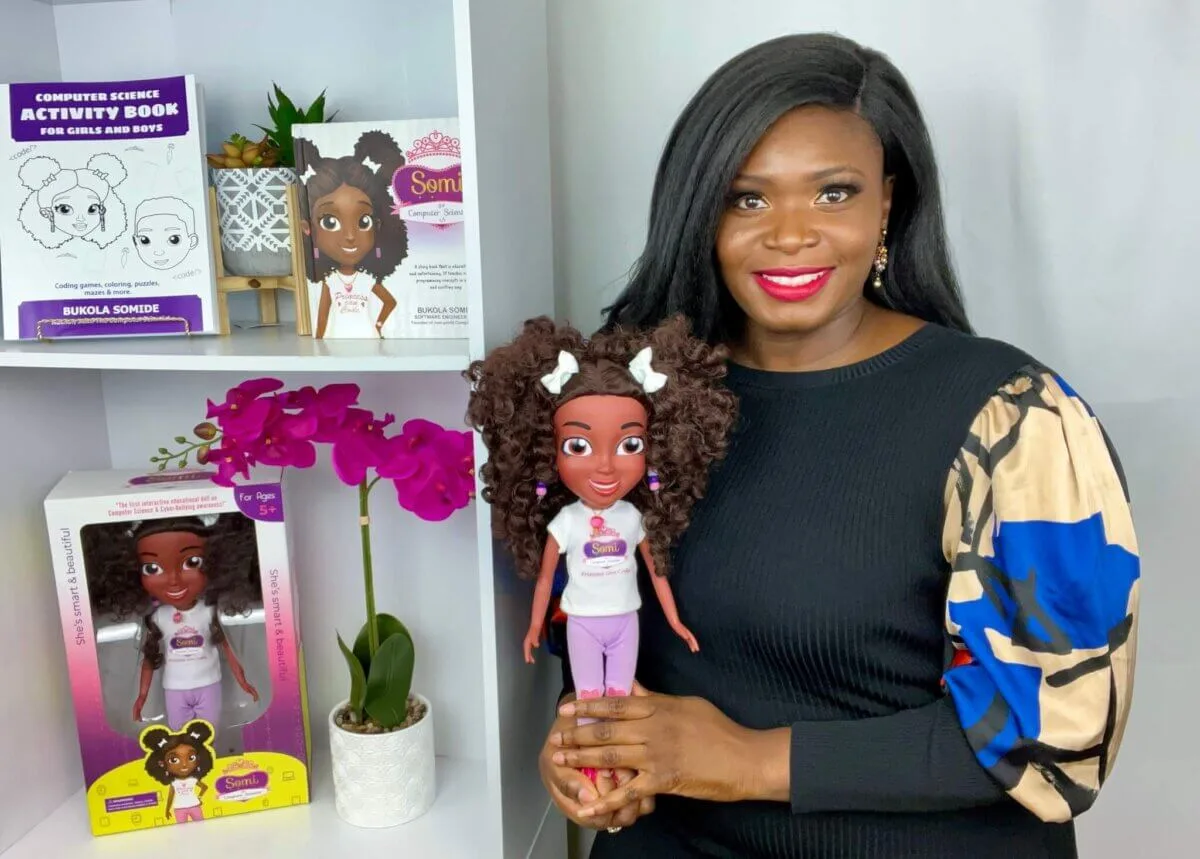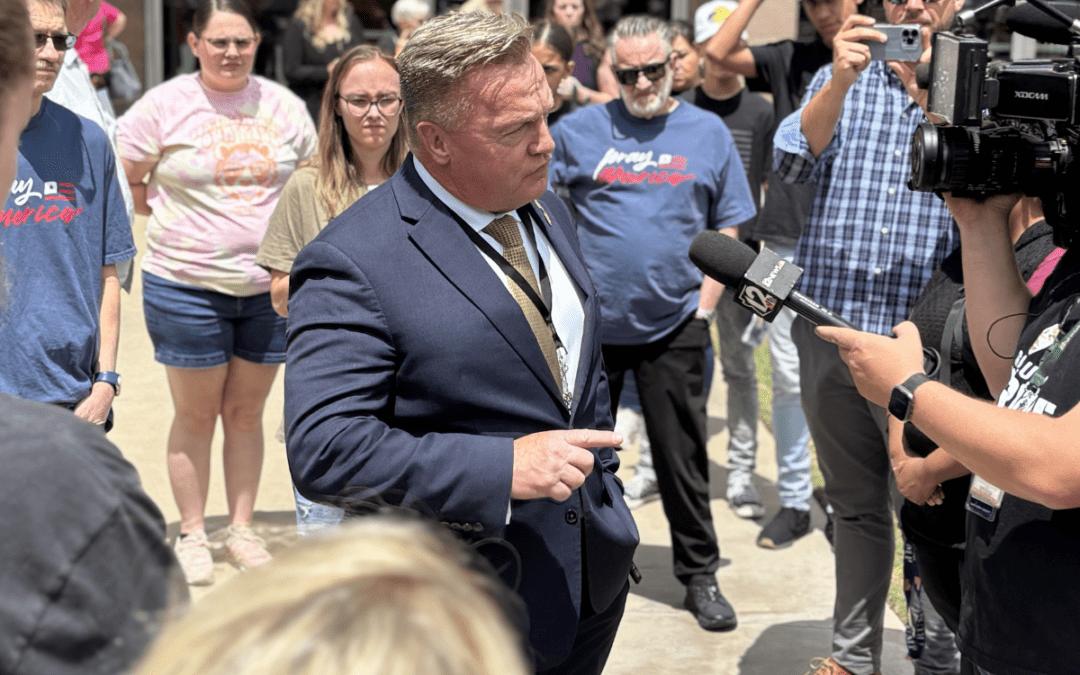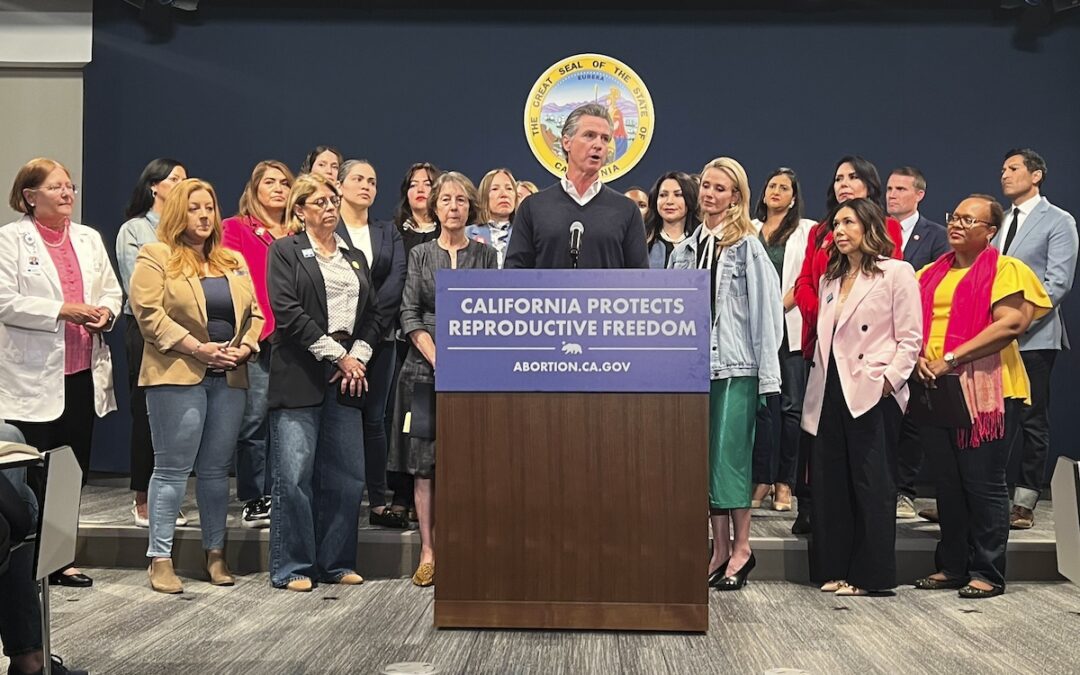
(Photo courtesy of Bukola Somide)
The Copper Courier spoke with Bukola Somide about her growing list of innovative inventions that aim to create more equitable access to science education.
An Arizona entrepreneur and tech expert has come up with a new way to get kids interested in computer science: toys.
Bukola Somide is the creator of Somi The Computer The Scientist doll, which teaches kids computer science concepts. She’s the founder of Innovant Technologies, the company that makes Somi and other tech education products. She also started the nonprofit CompSci ABC (Computer Science Awareness in Black Communities), which brings computer science education to underprivileged communities.
Somide immigrated to the US from Nigeria as a teenager. She became interested in computer science in 10th grade and studied it at the University of Maryland, earning her bachelor’s and master’s degrees there. She worked in software engineering for 17 years.
We spoke with Somide about the state of diversity in STEM today and how a doll like Somi is about much more than entertaining kids.
Watch the full conversation here, or check out some highlights below.
Note: This interview has been edited for length and clarity.
The Copper Courier:
According to Black Girls Who Code, 18% of students earning computer science degrees are white women, while less than 3% are Black women and less than 1% are Latino or Native American. Why do you think this isn’t a career path for more women, especially women of color?
Bukola Somide:
Well, it’s not like it’s not a career path, right? One, it’s about the awareness of it to let young girls, underrepresented girls, know that this is actually a choice and it’s available to them. And also, because it has been historically a male-dominated field, it can be intimidating sometimes to young women.
Why are young, Black girls not pursuing this? It was like, “Oh, computer science is boring,” or, “Oh, it’s too complex. I don’t feel smart enough.” So they feel intimidated or that there is a lack of mentors. So that’s what I was seeing. And I believe that’s been some of the deterrents in having more underrepresented women go into this field and actually thriving in this field.
CC:
And how do you think increasing representation brings more women of color into this field?
BS:
There’s sometimes limitation in our mind that blocks certain possibilities of what we can or cannot do, because maybe we don’t see it. We may be scared to dream big because we haven’t seen anybody else do it in our community. Like, “Oh, maybe I’m not supposed to do it,” or that fear of, “I’m not sure what it takes. The opposition that might be in the way. Will I be able to overcome? Will I be able to have that support system that’ll be there for me that I could lean on?”
CC:
Can you talk about Somi and how the idea for this doll came about and what she does?
BS:
Somi The Computer Scientist is actually a brand, and it actually started as a storybook initially.
So my solution was this: coming up with this underrepresented character that is interested in learning about computer programming concepts from her mom, who’s actually a software engineer. And what she tries to do is also demystify computer science, right? So she takes some of these terminologies that she’s learning, and she actually applies it to what she sees around her.
These concepts can actually be seen around us in real life, so I do that to make it relatable. So not only is it a relatable character, I simplify the definitions of these terms so it can be easily more understandable and digested. And then folks actually see it around them.
RELATED: Black ASU Students Speak About the Barriers They’ve Faced and How to Improve Representation
I believe that computer science is for everyone. The foundational basics of it is for everyone. We live in such a fast-paced digital age right now. Technology is only becoming more and more advanced. Our kids are becoming more embroiled in technology younger and younger. So they’re already using these tools. So let them be more knowledgeable about it, because I want to ensure that the kids don’t just grow up to be consumers of technology, but they can actually see themselves as creators of it, because these tools are there just to solve problems. That’s why we use them. They’re solutions, to help build solutions to problems.
So I had this next idea like, “OK, what about dolls?” I feel like God, the Lord, gives me ideas. I was like, “What about dolls? They’re fun for kids to play with.” And then the educational piece would be [the doll] talking, and she’s actually teaching these concepts in a fun way.
So it’s kind of like passively learning. So it’s not so intrusive in their face. They’re just having fun, but uh-oh, you’re learning at the same time, right? So just bringing awareness of some of these simple fundamentals. I think it’s just good to open a child’s possibilities.
CC:
What are some of those concepts that she is able to teach?
BS:
Two hundred and twenty-two words are embedded in 12 different phrases. So she touches on terms like algorithm, code, binary numbers, webpage, HTML, JavaScript, condition, loop. And she also touches on social awareness piece of cyberbullying. And some might think, “OK, what does that got to do with computer science?” Well, it wouldn’t exist if computer science didn’t exist. Right? So she just touches on that. She defines, “OK, this is what it is, and let’s be more cyber friendly.”
But yeah, so some of those terms, like for example, condition. She gives the definition. It’s a true or false statement, such as a cat barks is false, but a cat meows is true. So I made that relatable so kids can be like, “Oh, that’s funny.” So just to make it fun for the kids to listen to these definitions and be able to make sense of it is what she does.
CC:
So I know that you’ve worked your activity books and this type of education into some workshops that you bring to communities. What do those workshops look like, and how can people know about them if they’re interested?
BS:
We partnered throughout CompSci ABC with Infosys Foundation USA, where they’re actually providing funding for the doll and also these books to be used by K-4 teachers in the classroom.
So once the program is completed—because it’s actually in the construction phase right now, to create all the different tools that the teachers need to use to understand, “OK, how can you leverage these books? How can you use it in the classroom?” then it’ll go live. We’re looking possibly end of April for that to happen.
Even just yesterday, we collaborated with afterschool programs, such as a Boys and Girls Club or even ICAN. They’ve shown some interest in our products, and we’ve done a few sessions already, and we just go in and teach the same things the teachers would do in the classroom. We did it in the afterschool program setting, and we’re able to give out the dolls and the books.
CC:
And so yesterday, when we chatted briefly, you mentioned that Somi, the name, came from your daughter. Can you talk a little bit about her, and is she interested in computer science?
BS:
My daughter’s middle name is Olusomi. I’m originally from Nigeria, so that name means God protects me. So that’s where I lifted that name from, Somi.
And my daughter is actually seven right now, but when I actually started to write the manuscript for this book, she was only two. It’s definitely been a blessing, because this is the first time I’ve ever created a children’s book. So I definitely had to lean on my interaction with my daughter so that I could infuse it into the character.
The character is about 8 years old, right? I infused that relationship in the book between her and her mom, and it’s from my relationship with my daughter and even our personalities. It’s like a mesh. I did a mesh to build up this character. So I’ve definitely leveraged that relationship. Praise God for that.

And yeah, I’ve been teaching her a bunch of stuff about computer science, but she wants to do so many things, and I’m like, “Absolutely. You don’t have to do just one thing.” She wants to open a donut shop and also be a fashion designer. That’s OK. Dream big.
Like I said, computer science is for everyone, so I definitely want her to have that foundational knowledge as well. But if it’s not her purpose or her calling to grow up to be a software engineer or stay in this particular industry, that is OK. I’m OK with that.
So to give you a quick background: Back in 10th grade—and this was in the late ’90s that I heard about computer science, and I had no clue really what it was. I was like, “OK, I love science, and computers are the way of the future. I’ll pursue computer science.”
Just so naive the way I did it, right? And when it came time for 12th grade and going into college, my dad was like, “OK, what do you want to do?” I was like, “Computer science.” He was like, “What’s that?” And I was like, “I don’t know.”
So he actually went to the library because there weren’t any search engines at the time back then. So he did it the old-fashioned way. Went to the library, did some research, and then he came back to me and said, “They make money. You can do computer science.” Hey, give it up for parents. They want to make sure their kids actually can support themselves.
So that’s really the genesis of it. And then when I was transitioning into college, I got into this—it’s called a bridge program. I went to the University of Maryland College Park, and the bridge program helped minorities majoring in computer, math, and physical sciences to transition from high school to college and also to retain them in the majors.
And in hindsight, that program was such a benefit for me. I didn’t know it at the time. I didn’t really know what I was getting into. I didn’t know computer science was a male-dominated field. I wasn’t thinking all of that. So actually having that program and the advisors in that program as a support system was actually crucial for me.
And it introduced me to computer science for the first time, learning to program for the first time. And I was just like, “Oh, my God, this is a completely different world. It’s like the matrix.”
But when I was able to get my program to work, I was like, “Wow.” There was this gratification I got that I created something from scratch that actually worked. And I think that’s when I got addicted to it, and I realized that I did have a gifting for thinking logically and writing code.
I actually enjoy writing code. Some people do not, and that’s fine. And that’s one thing I want to do is define computer sciences. Computer science is not just coding. So some people don’t like to code, and that’s OK. There are many other professions under this umbrella in this industry that you can focus on, like database, the backend, all this other stuff, data science, if you love math. Those options are there.
CC:
How did you make the transition from student to working in the field and then to entrepreneur?
BS:
Right after college, I honestly didn’t have mentors that looked like me in the field. I really didn’t. So who I really relied on was really just my peers to gain advice on their strategy on how to move up the ladder in corporate America, how to tackle things, what to apply for, that kind of thing. So that’s initially how it was.
But fast forward 10-plus years later, I got to a point in my career where I was feeling a bit unfulfilled. I was like, “I want to give back to the community, but I want to do it in a way that is fulfilling for me, that brings me joy, that really resonates with me.”
And then I worked 17 years in software engineering, and I was usually the only Black person or Black woman on the software development team. That was just status quo for me. So I’m like, “Do you know what? I want to give back by helping to support young minority girls pursuing computer science in college.”

I actually wanted to create a scholarship program. That was the first idea I got. I’m like, “I don’t care how little the money is. I can still support them.” Because I remember when I was back in college, I got little scholarships that gave me like $500 each semester, and that helped with books, because books were quite expensive. So I was like, “I don’t care how little it is. That’s what I want to do.”
But it quickly dawned on me that do you know what? By the time they get to college or even senior year, they’ve actually decided what they want to major in. So if I want to help increase this number of minority girls that are thriving in computer science and industry, I needed to catch them sooner, much younger. So that’s when the wheels started turning and I was thinking, “OK, what kind of products and services can I create that were going to be entertaining to grab their attention and engage them and, of course, inject the educational piece?” So that’s how that started.
CC:
What has it been like starting a business here in Arizona? What has the small business climate been like for you here?
BS:
Actually, I think it’s been quite smooth sailing. You see, when I was in Maryland, I actually had a business there, too, as well, and I didn’t have a very good business model. So after four years, I just turned that in. But when … I started to get in line with my purpose, that’s when I started.
I actually launched both my nonprofit and for-profit around the same time, because my for-profit was created to help support the mission of my nonprofit. So they have that synergy between them.
And then I just knew what to do. It’s actually quite much easier than you think as far as registering the LLC.
I’m more introverted than extroverted. I always say I’m introverted by nature and extroverted by nurture, meaning I have to develop this skill. So speaking of that, that was a little bit of a challenge for me in getting awareness out there of what I’m doing. I wasn’t really networking, and I’m told that’s what you need to do to be successful. It’s all about relationships, really.
And so it turned out that, actually, the pandemic was a blessing for me. It really was, because—I don’t know if you saw the memes on social media back when everything was happening—introverts were thriving in the pandemic. We didn’t mind staying at home and doing Zoom calls all day. So that was such a blessing for me, because now it was so commonplace and accepted to host meetings online, having events online.
So I started plugging in. I started becoming members of certain organizations so that I could start networking and putting myself out there, just introducing myself more. And little by little that starts to lead to relationships, or folks in my work wanting to collaborate or talk. And that’s how I think I blossomed when it comes to that relationship piece.
And I know here in Arizona, they have the Phoenix Startup Week as well, and that was the first time they’ve ever had it online. I got to meet other folks here and collaborated with some, or at least just pick their brain.
Looking for the latest Arizona news? Sign up for our FREE daily newsletter.
Politics

Arizona Sens. Anthony Kern, Jake Hoffman, indicted for fake election scheme
Eighteen individuals involved in a conspiracy to overturn Arizona’s election results in 2020 were indicted by a grand jury Wednesday and charged...

Gov. Gavin Newsom wants to let Arizona doctors provide abortions in California
California law generally allows abortion up to the point of fetal viability, which is around 24 weeks. SACRAMENTO, Calif. (AP) — Arizona doctors...
Local News

‘Attempted insurrection:’ Republican lawmakers retaliate after Dems’ success on abortion ban repeal
Members of the Arizona Freedom Caucus filed an ethics complaint after Democrats’ vocal push to repeal the ban sparks change. Republican legislators...

The 3 best bowling alleys in Arizona, according to our readers
Are you looking for the best bowling experience in Arizona? Look no further! Our reader's poll results are in, and we have compiled a list of your...





